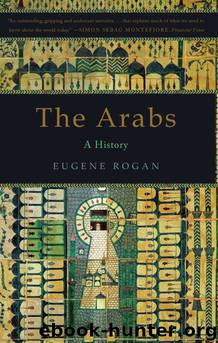Arabs by Eugene Rogan

Author:Eugene Rogan [Rogan, Eugene]
Language: eng
Format: epub
Tags: History, Middle East, General, World
ISBN: 9780718196783
Google: 16U0mEbf4nAC
Amazon: 0718196783
Publisher: Basic Books
Published: 2012-03-31T16:00:00+00:00
The entire Arab world was stunned by the magnitude of the Palestine disaster. Yet in this moment of crisis, Arab intellectuals proved remarkably clear-sighted about both the causes and the consequences of the loss of Palestine.
Two critical works appeared in the immediate aftermath of the first Arab-Israeli War that set the tone for Arab self-criticism and reform. The first was written by Constantine Zurayk, one of the great Arab intellectuals of the twentieth century. Born in Damascus in 1909, Zurayk had completed his B.A. at the American University of Beirut, his M.A. at the University of Chicago, and his doctorate at Princeton—all by the age of twenty-one. He spent his life between academic and public service in Lebanon and Syria, and wrote a string of hugely influential works on Arab nationalism. It was Zurayk who gave the 1948 war its Arabic name, al-Nakba, with his influential tract Ma’nat al-Nakba (or, “The Meaning of the Disaster”), published in Beirut at the height of the war in August 1948.30
The second landmark book was written by a Palestinian notable named Musa Alami. The son of a former mayor of Jerusalem, Alami studied law at Cambridge before entering service with the mandate government in Palestine. He rose to the rank of Arab secretary to the high commissioner and crown counsel before resigning in 1937 at the height of the Arab Revolt, to enter private practice and support the nationalist movement. Alami represented Palestinian aspirations in the London conferences of 1939 and 1946–1947 and served as Palestinian representative to the formative meetings of the Arab League. His March 1949 essay ’Ibrat Filastin (“The Lesson of Palestine”), reflected on the Arabs’ total defeat and the route to national regeneration.31
Both authors recognized that the loss of Palestine and the creation of Israel opened a dangerous new chapter in Arab history. “The defeat of the Arabs in Palestine,” Zurayk warned, “is no simple setback or light, passing evil. It is a disaster in every sense of the word and one of the harshest of the trials and tribulations with which the Arabs have been afflicted throughout their long history—a history marked by numerous trials and tribulations.”32 Arab failure to confront this new danger would condemn them to a future of division and rule, not so unlike the colonial era from which they were only just gaining their independence.
Given the similarities in their diagnoses of Arab ills, it is not surprising that Alami and Zurayk recommended similar cures. The spectacle of Arab divisions impressed on both men the need for Arab unity. The post–World War I settlement, and the partition of the Arab world between Britain and France, had fragmented and weakened the Arab nation. The Arabs, they argued, would only realize their potential as a people by overcoming the divisions of the imperial order through Arab unity. They recognized the contradictions between narrow nation-state nationalism (e.g., the distinct nationalism of Egyptians or Syrians) and the broader Arab nation to which they aspired. Zurayk believed formal union was impossible
Download
This site does not store any files on its server. We only index and link to content provided by other sites. Please contact the content providers to delete copyright contents if any and email us, we'll remove relevant links or contents immediately.
| Africa | Americas |
| Arctic & Antarctica | Asia |
| Australia & Oceania | Europe |
| Middle East | Russia |
| United States | World |
| Ancient Civilizations | Military |
| Historical Study & Educational Resources |
Empire of the Sikhs by Patwant Singh(22172)
The Wind in My Hair by Masih Alinejad(4424)
The Templars by Dan Jones(4188)
Rise and Kill First by Ronen Bergman(4012)
The Rape of Nanking by Iris Chang(3516)
12 Strong by Doug Stanton(3057)
Blood and Sand by Alex Von Tunzelmann(2608)
The History of Jihad: From Muhammad to ISIS by Spencer Robert(2207)
Babylon's Ark by Lawrence Anthony(2070)
No Room for Small Dreams by Shimon Peres(1991)
The Turkish Psychedelic Explosion by Daniel Spicer(1988)
Gideon's Spies: The Secret History of the Mossad by Gordon Thomas(1950)
Inside the Middle East by Avi Melamed(1939)
The First Muslim The Story of Muhammad by Lesley Hazleton(1881)
Arabs by Eugene Rogan(1835)
Bus on Jaffa Road by Mike Kelly(1784)
Come, Tell Me How You Live by Mallowan Agatha Christie(1768)
Kabul 1841-42: Battle Story by Edmund Yorke(1649)
Citizen Strangers by Robinson Shira N.;(1535)
